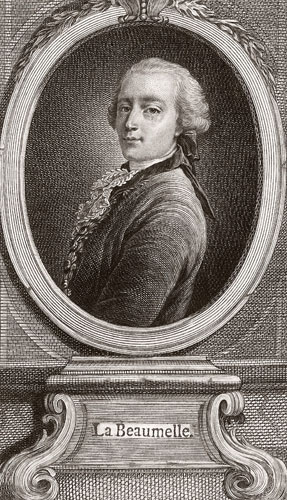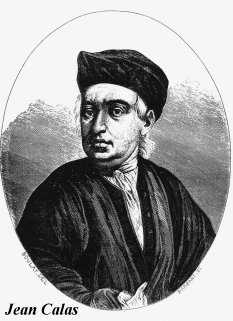|
Laurent Angliviel De La Beaumelle
Laurent Angliviel de la Beaumelle (28 January 1726 in Valleraugue – 17 November 1773 in Gard) was a French Huguenot, Protestant writer. Life La Beaumelle was a brilliant student in Alès and stayed there for eight years (1734–42). He joined the Reformed Church in 1744. In 1745 he went to Geneva; the next year he joined the Freemasons. In 1747 he went to Denmark and wrote ''Traité sur la tolérance'', and ''L'Asiatique tolérant, ou traité à l'usage de Zeokinizul, roi des Kofirans, surnommé le Chéri'' published in Amsterdam in 1749. Then he was appointed as professor of French literature at the University of Copenhagen. In 1751 he received almost simultaneously with Voltaire, an invitation by the Prussian King Frederick the Great to come to Sanssouci in Potsdam. Beaumelle fell out with "La Voltaire" and he went back to Paris, visiting Gotha (town), Gotha and Frankfurt, in 1752 with deadly hatred of Voltaire. Because of his "Notes sur le siècle de Louis XIV", La Beaume ... [...More Info...] [...Related Items...] OR: [Wikipedia] [Google] [Baidu] |
Jean Calas
Jean Calas (1698 – 10 March 1762) was a merchant living in Toulouse, France, who was tried, tortured and executed for the murder of his son, despite his protestations of innocence. Calas was a Protestant in an officially Catholic society. Doubts about his guilt were raised by opponents of the Catholic Church and he was exonerated in 1764. In France, he became a symbolic victim of religious intolerance, along with François-Jean de la Barre and Pierre-Paul Sirven. Background Calas, along with his wife, was a Protestant. France was then a Catholic country; Catholicism was the state religion, with no legal right for individuals to practice different faiths. While the harsh oppression of Protestantism initiated by King Louis XIV had largely receded, Protestants were, at best, tolerated. Louis, one of Calas' sons, converted to Catholicism in 1756. Death of Marc-Antoine Calas left, The arrest of Calas. On 13–14 October 1761, another of the Calas sons, Marc-Antoine, was found ... [...More Info...] [...Related Items...] OR: [Wikipedia] [Google] [Baidu] |
Huguenots
The Huguenots ( , also , ) were a Religious denomination, religious group of French people, French Protestants who held to the Reformed, or Calvinist, tradition of Protestantism. The term, which may be derived from the name of a Swiss political leader, the Genevan burgomaster Bezanson Hugues (1491–1532?), was in common use by the mid-16th century. ''Huguenot'' was frequently used in reference to those of the Reformed Church of France from the time of the Protestant Reformation. By contrast, the Protestant populations of eastern France, in Alsace, Moselle (department), Moselle, and Montbéliard, were mainly Lutheranism, Lutherans. In his ''Encyclopedia of Protestantism'', Hans Hillerbrand wrote that on the eve of the St. Bartholomew's Day massacre in 1572, the Huguenot community made up as much as 10% of the French population. By 1600, it had declined to 7–8%, and was reduced further late in the century after the return of persecution under Louis XIV, who instituted the ''dr ... [...More Info...] [...Related Items...] OR: [Wikipedia] [Google] [Baidu] |
French Freemasons
French (french: français(e), link=no) may refer to: * Something of, from, or related to France ** French language, which originated in France, and its various dialects and accents ** French people, a nation and ethnic group identified with France ** French cuisine, cooking traditions and practices Fortnite French places Arts and media * The French (band), a British rock band * "French" (episode), a live-action episode of ''The Super Mario Bros. Super Show!'' * ''Française'' (film), 2008 * French Stewart (born 1964), American actor Other uses * French (surname), a surname (including a list of people with the name) * French (tunic), a particular type of military jacket or tunic used in the Russian Empire and Soviet Union * French's, an American brand of mustard condiment * French catheter scale, a unit of measurement of diameter * French Defence, a chess opening * French kiss, a type of kiss involving the tongue See also * France (other) * Franch, a surname * French ... [...More Info...] [...Related Items...] OR: [Wikipedia] [Google] [Baidu] |
18th-century French Male Writers
The 18th century lasted from January 1, 1701 ( MDCCI) to December 31, 1800 ( MDCCC). During the 18th century, elements of Enlightenment thinking culminated in the American, French, and Haitian Revolutions. During the century, slave trading and human trafficking expanded across the shores of the Atlantic, while declining in Russia, China, and Korea. Revolutions began to challenge the legitimacy of monarchical and aristocratic power structures, including the structures and beliefs that supported slavery. The Industrial Revolution began during mid-century, leading to radical changes in human society and the environment. Western historians have occasionally defined the 18th century otherwise for the purposes of their work. For example, the "short" 18th century may be defined as 1715–1789, denoting the period of time between the death of Louis XIV of France and the start of the French Revolution, with an emphasis on directly interconnected events. To historians who expand t ... [...More Info...] [...Related Items...] OR: [Wikipedia] [Google] [Baidu] |
18th-century French Writers
The 18th century lasted from January 1, 1701 ( MDCCI) to December 31, 1800 ( MDCCC). During the 18th century, elements of Enlightenment thinking culminated in the American, French, and Haitian Revolutions. During the century, slave trading and human trafficking expanded across the shores of the Atlantic, while declining in Russia, China, and Korea. Revolutions began to challenge the legitimacy of monarchical and aristocratic power structures, including the structures and beliefs that supported slavery. The Industrial Revolution began during mid-century, leading to radical changes in human society and the environment. Western historians have occasionally defined the 18th century otherwise for the purposes of their work. For example, the "short" 18th century may be defined as 1715–1789, denoting the period of time between the death of Louis XIV of France and the start of the French Revolution, with an emphasis on directly interconnected events. To historians who expand th ... [...More Info...] [...Related Items...] OR: [Wikipedia] [Google] [Baidu] |
1726 Births
Seventeen or 17 may refer to: *17 (number), the natural number following 16 and preceding 18 * one of the years 17 BC, AD 17, 1917, 2017 Literature Magazines * ''Seventeen'' (American magazine), an American magazine * ''Seventeen'' (Japanese magazine), a Japanese magazine Novels * ''Seventeen'' (Tarkington novel), a 1916 novel by Booth Tarkington *''Seventeen'' (''Sebuntiin''), a 1961 novel by Kenzaburō Ōe * ''Seventeen'' (Serafin novel), a 2004 novel by Shan Serafin Stage and screen Film * ''Seventeen'' (1916 film), an American silent comedy film *''Number Seventeen'', a 1932 film directed by Alfred Hitchcock * ''Seventeen'' (1940 film), an American comedy film *''Eric Soya's '17''' (Danish: ''Sytten''), a 1965 Danish comedy film * ''Seventeen'' (1985 film), a documentary film * ''17 Again'' (film), a 2009 film whose working title was ''17'' * ''Seventeen'' (2019 film), a Spanish drama film Television * ''Seventeen'' (TV drama), a 1994 UK dramatic short starring Christ ... [...More Info...] [...Related Items...] OR: [Wikipedia] [Google] [Baidu] |
1773 Deaths
Events January–March * January 1 – The hymn that becomes known as ''Amazing Grace'', at this time titled "1 Chronicles 17:16–17", is first used to accompany a sermon led by curate John Newton in the town of Olney, Buckinghamshire, England. * January 12 – The first museum in the American colonies is established in Charleston, South Carolina; in 1915, it is formally incorporated as the Charleston Museum. * January 17 – Second voyage of James Cook: Captain Cook in HMS Resolution (1771) becomes the first European explorer to cross the Antarctic Circle. * January 18 – The first opera performance in the Swedish language, ''Thetis and Phelée'', performed by Carl Stenborg and Elisabeth Olin in Bollhuset in Stockholm, Sweden, marks the establishment of the Royal Swedish Opera. * February 8 – The Grand Council of Poland meets in Warsaw, summoned by a circular letter from King Stanisław August Poniatowski to respond to the Kingdom's ... [...More Info...] [...Related Items...] OR: [Wikipedia] [Google] [Baidu] |
The Age Of Louis XIV
''The Age of Louis XIV'' (''Le Siècle de Louis XIV'', also translated ''The Century of Louis XIV'') is a historical work by the French historian, philosopher, and writer Voltaire, first published in 1751. Through it, the French 17th century became identified with Louis XIV of France, who reigned from 1643 to 1715. Background A letter in May 1732 is the first recorded mention of Voltaire's intent to write a history of the reign of Louis XIV. He stopped and resumed the project multiple times, expressing the fear that he might not live long enough to complete it. For preparation, he read two hundred volumes of material, plus many unpublished memoirs, as well as historical documents he found in the archives of Louvre, the Louvre. Content In common with other Age of Enlightenment, Enlightenment philosophers, Voltaire saw the age of Alexander the Great and Pericles, the age of Julius Caesar, Caesar and Augustus, and the Italian Renaissance as "great ages" or "ages of light". He pre ... [...More Info...] [...Related Items...] OR: [Wikipedia] [Google] [Baidu] |
Polemic
Polemic () is contentious rhetoric intended to support a specific position by forthright claims and to undermine the opposing position. The practice of such argumentation is called ''polemics'', which are seen in arguments on controversial topics. A person who writes polemics, or speaks polemically, is called a ''polemicist''. The word derives , . Polemics often concern questions in religion or politics. A polemical style of writing was common in Ancient Greece, as in the writings of the historian Polybius. Polemic again became common in medieval and early modern times. Since then, famous polemicists have included satirist Jonathan Swift; Italian physicist and mathematician Galileo; French Enlightenment writer, historian, and philosopher Voltaire; Christian anarchist Leo Tolstoy; socialist philosophers Karl Marx and Friedrich Engels; novelist George Orwell; playwright George Bernard Shaw; communist revolutionary Vladimir Lenin; psycholinguist Noam Chomsky; social critics Christ ... [...More Info...] [...Related Items...] OR: [Wikipedia] [Google] [Baidu] |
Louis XV
Louis XV (15 February 1710 – 10 May 1774), known as Louis the Beloved (french: le Bien-Aimé), was King of France from 1 September 1715 until his death in 1774. He succeeded his great-grandfather Louis XIV at the age of five. Until he reached maturity (then defined as his 13th birthday) on 15 February 1723, the kingdom was ruled by his grand-uncle Philippe II, Duke of Orléans, as Regent of France. Cardinal Fleury was chief minister from 1726 until his death in 1743, at which time the king took sole control of the kingdom. His reign of almost 59 years (from 1715 to 1774) was the second longest in the history of France, exceeded only by his predecessor, Louis XIV, who had ruled for 72 years (from 1643 to 1715). In 1748, Louis returned the Austrian Netherlands, won at the Battle of Fontenoy of 1745. He ceded New France in North America to Great Britain and Spain at the conclusion of the disastrous Seven Years' War in 1763. He incorporated the territories of the Duchy of Lorr ... [...More Info...] [...Related Items...] OR: [Wikipedia] [Google] [Baidu] |



.jpg)
